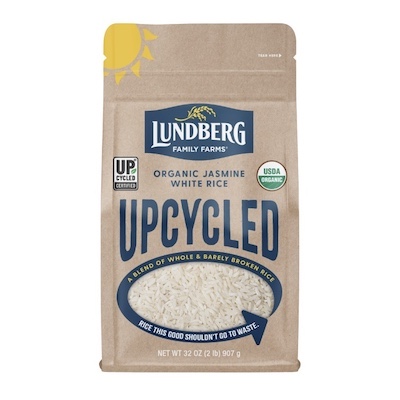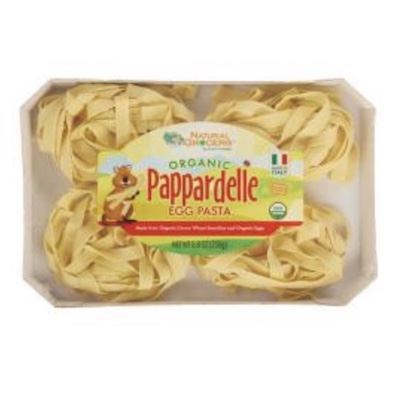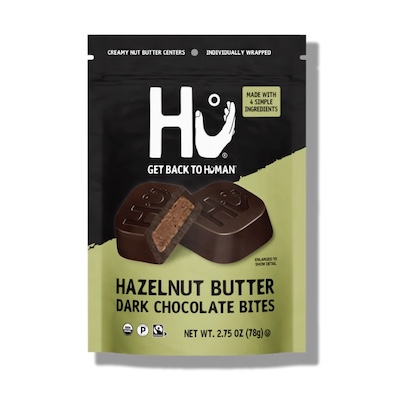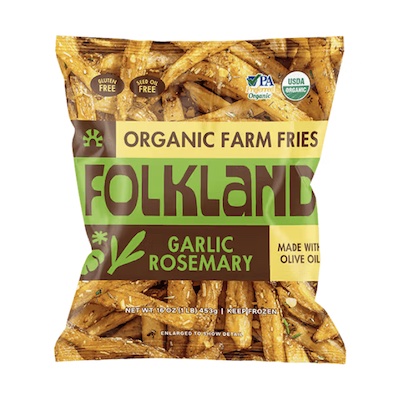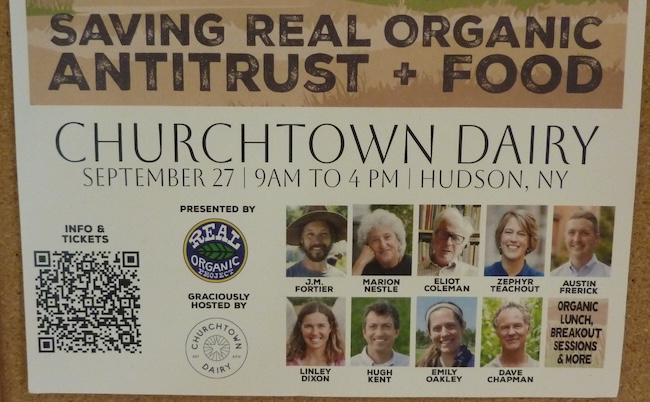
2025 Real Organic Project Symposium: Some Very Hard Truths But Strong Reasons for Optimism
How Organic Insider operates: We accept no advertising, we have no paywalls and we make our newsletters free to everyone because vital information about our industry needs to get out to as many people as possible. Please consider becoming an Organic Insider+ subscriber, whether you are an individual or a company. Thank you so much.
This past Saturday, the Real Organic Project held its symposium Saving Real Organic: Antitrust + Food at Churchtown Dairy in Hudson, New York.
It drew over 300 people from 28 states and six countries. Nearly one-third were organic farmers.

Here are my five key takeaways from the 2025 Real Organic Project Symposium:
1) THE MAGNITUDE OF CONCENTRATED POWER IN THE FOOD INDUSTRY IS JARRING
Two of the featured speakers painted a grim picture of corporate control in our food system today.
Austin Frerick, author of the must-read book Barons: Money, Power, and the Corruption of America’s Food Industry, explained that the U.S. food markets are among the most concentrated of any industry in the country, with some companies commanding up to 85% market share, making it easy for them to act like a cartel.
Zephyr Teachout said that three companies — Walmart, Amazon and Instacart — together control 70% of online sales, and she framed the food monopolies in the U.S. as not only economic but democratic threats, as they use lobbying, regulatory capture and mergers to entrench their influence and choke competition. She suggested that individual states could combat this by banning both pricing discrimination and kickbacks from distributors, among other things.
2) A PLEA FOR “OTRI”
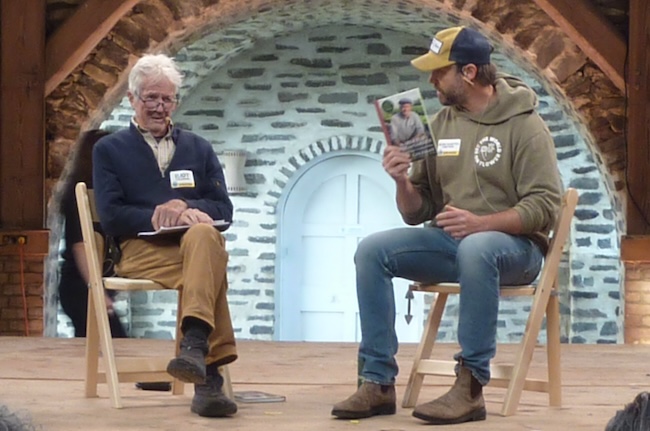 (From left to right, Eliot Coleman being interviewed by Jean-Martin Fortier.)
(From left to right, Eliot Coleman being interviewed by Jean-Martin Fortier.)
Organic farming icon Eliot Coleman told the audience that OMRI (the Organic Materials Review Institute — the organization that reviews and approves external inputs) gives off the impression that specially-approved products have always been a part of organic.
“They have not,” he said emphatically. “Processes have been replaced by products, yet a well-managed farm needs no external inputs, regardless of its size.”
Eliot suggested that the industry embrace OTRI, the Organic Techniques Review Institute, which would publish data re-emphasizing the importance of green manures, crop rotations, cover crops, growing legumes and incorporating organic matter with shallow non-inversion tillage.
3) THE MYTH OF THE U.S. FEEDING THE WORLD
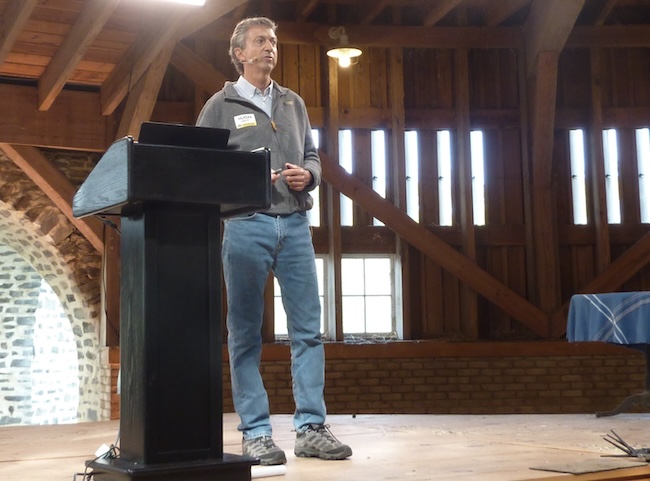
We constantly hear that we need GMOs and chemicals to feed the world — a narrative pushed by the ag-biotech lobbyists for decades.
In his presentation, Hugh Kent from King Grove Organic Farm (above) provided evidence that the world is actually feeding the U.S.
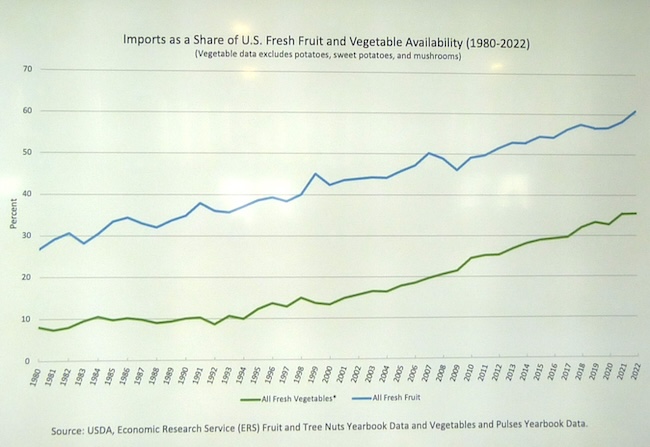
As of 2022, the imports of all fresh fruit (blue line) are greater than 60%, and the imports of all fresh vegetables (green line) are nearly 40%. These numbers do not account for canned fruit, which would probably make these numbers spike higher.
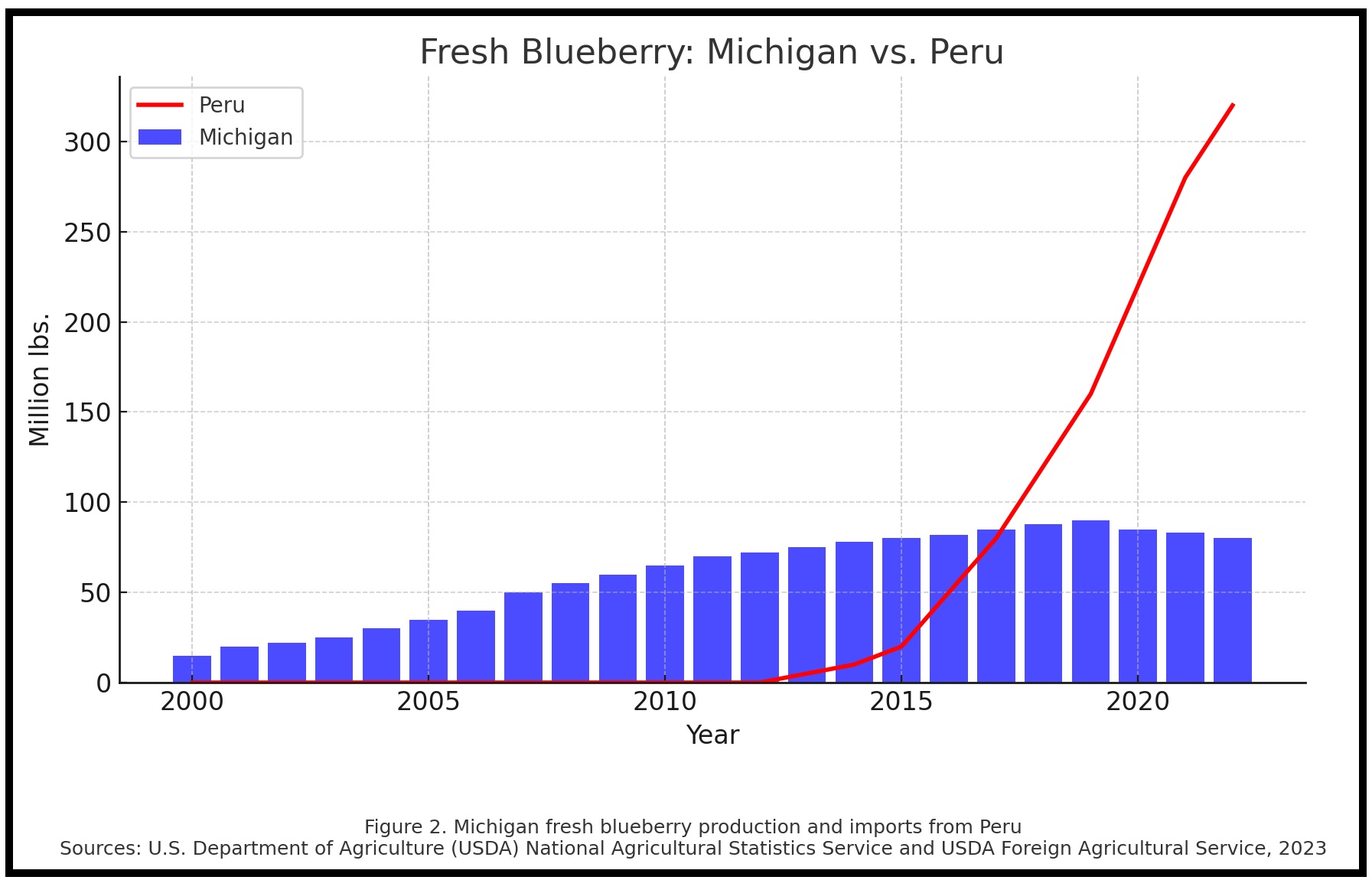
In Figure 2, it shows that blueberry imports from Peru (red line) are skyrocketing, to more than 300 million pounds, while fresh blueberry production from Michigan (blue bars) is a fraction of the size and is on the decline.
In another chart that he presented, according to USDA data, it showed that blueberry imports from Mexico are also skyrocketing, to nearly 150 million pounds in 2022 from almost zero in 2000. Meanwhile, fresh blueberry production from Florida is a fraction of the size, at approximately 25 million pounds, and is experiencing no growth.
“What the data tells us is that hydroponics (mainly imported) are becoming the predominant blueberry growing system in the world. This is not only decimating real organic blueberry growers in the U.S., it is having the same effect on soil-based conventional berry growers as well. In other words, this is wreaking havoc on many farmers across our country,” said Hugh Kent.
This raises important questions: How does this align with President Trump’s America First policy? And how is such reliance on foreign food sources good for national security?
4) REAL ORGANIC PROJECT AS A STANDALONE CERTIFICATION

During her presentation, Emily Oakley, a former member of the National Organic Standards Board and a Real Organic Project vegetable farmer at Three Springs Farm in Oklahoma, argued the case that the Real Organic Project should be a standalone certification, not merely an add-on label to the USDA organic seal.
She said thousands of farmers have dropped out of USDA certification — either because of costs or philosophical differences — but are still farming in accordance to organic rules. And these farmers need a home.
Emily Oakley’s argument was certainly compelling, but there was one catch, she acknowledged. It would require a $10 million annual budget.
Do not be surprised if this comes to fruition one day.
5) SPREAD AND MULTIPLY

A protégé of Eliot Coleman, Canadian Jean-Martin Fortier (above) is a leading global voice shaping the future of real organic farming.
His book The Market Gardener: A Successful Grower’s Handbook for Small-Scale Organic Farming has sold over 350,000 copies and has been translated into twelve languages. That has led to the creation of the Market Gardener Mastercourse and the Market Gardener Institute — all with the goal of teaching people around the world how to farm organically and do it profitably. Already, his online course has been in the hands of nearly 12,000 students.
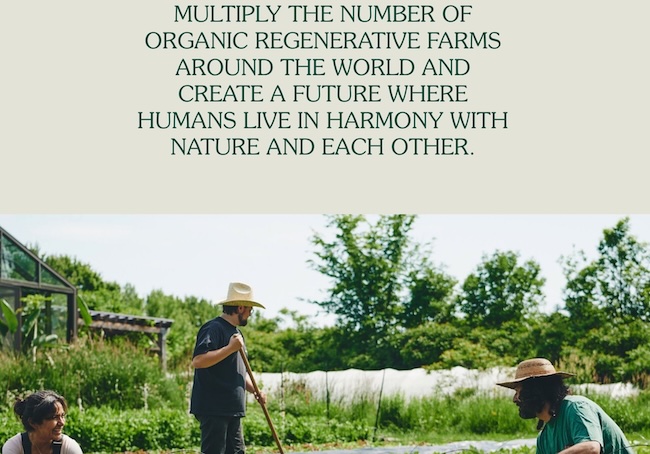
With the traditional retail/wholesale model having become unfeasible for so many farmers, the idea is to have small farms everywhere that are supported by local communities where consumers buy direct.
Hugh Kent of King Grove Organic Farm is a testament to this.
“We are a medium-sized farm that went from 100% wholesale to 100% direct-to-consumer in five years. This was all done from scratch and on-the-fly,” he said. “This can be achieved by many other small and medium-scale farms, and as the quality of food continues to deteriorate in our country, anyone offering high-quality produce will find strong demand. The data bears this out. Ship-to-home, U.S. online grocery sales grew 19%, year-over-year, in August 2025.”
“The idea is to spread high-quality farming, not scale it up within one organization. With direct sales, farms can stay relatively small, multiply and succeed.”
IN CLOSING
When Dave Chapman, co-director of the Real Organic Project, ended the symposium and talked about the numerous inherent challenges that real organic faces, he said, “What can we do? We can come together.”
On Saturday in Hudson, New York, that’s exactly what we did.
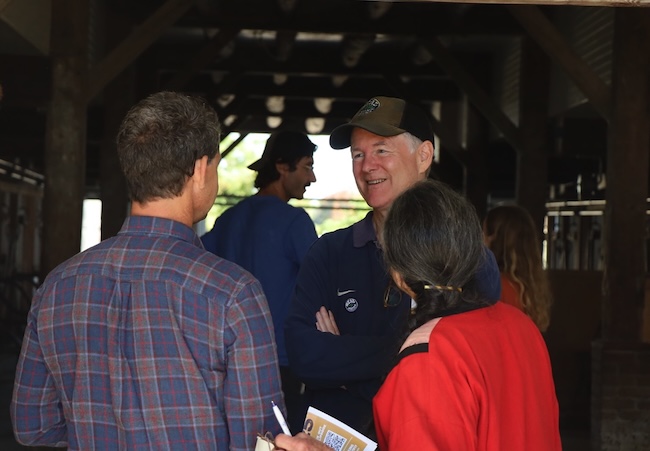 (Dave Chapman, co-director of the Real Organic Project.)
(Dave Chapman, co-director of the Real Organic Project.)
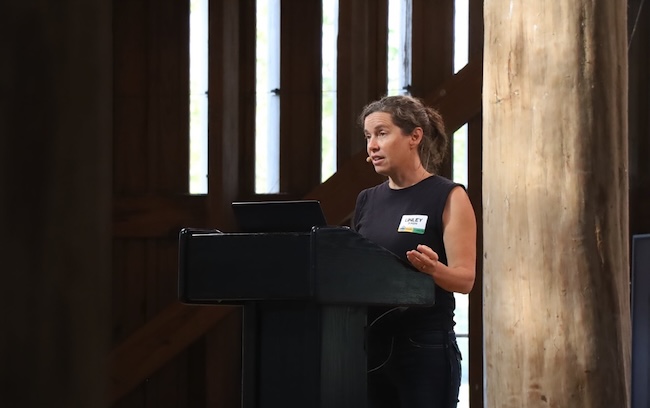 (Linley Dixon, co-director of the Real Organic Project.)
(Linley Dixon, co-director of the Real Organic Project.)
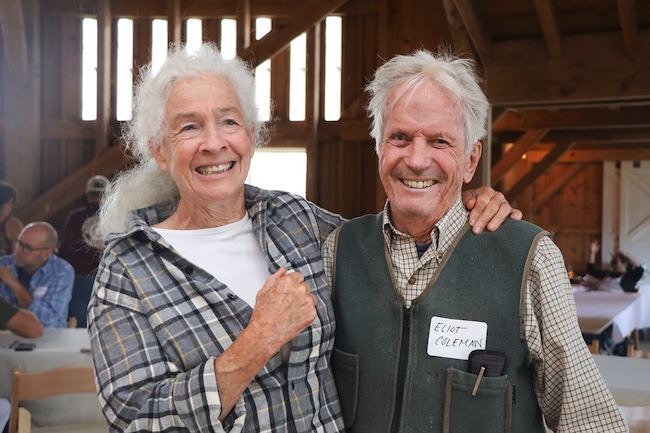 (Abby Rockefeller, host of the event at her Churchtown Dairy, and Eliot Coleman. The three photos above are courtesy of the Real Organic Project.)
(Abby Rockefeller, host of the event at her Churchtown Dairy, and Eliot Coleman. The three photos above are courtesy of the Real Organic Project.)
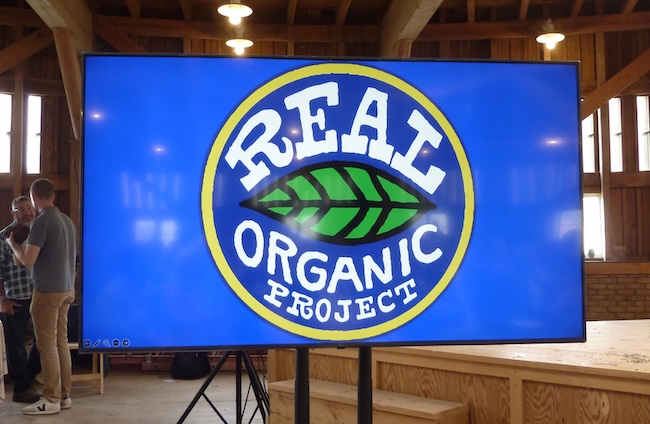
 |
With gratitude, 
Max Goldberg, Founder |
Quick Hits
* I was recently interviewed on INFRA’s The Buyer’s Desk podcast, where we discussed organic integrity, among many other things.
* The “best organic city” in Europe.
* The GMO-labeling movement in Canada is picking up steam and asking for signatures.
* As an alternative to alcohol, The Republic of Tea is now offering a 12 oz. glass bottled iced tea sampler case in a variety of flavors, including pomegranate green tea and blackberry sage black tea.
* AEG, the world’s leading sports and live entertainment company, and Tractor Beverage Company have signed a partnership bringing organic options to music fans at live events.
* Article 6 has secured the rights for The Detox Project across 31 countries, bringing Glyphosate Residue Free certification to more markets than ever before.
* Burroughs Family Farms will be hosting its 5th Annual Regenerative Tree Nut Field Day on January 27-28, 2026.
* In celebration of Organic Harvest Month, Rodale Institute is offering its annual Organic Hero gift box.
* Missy Hughes, a former Organic Valley executive, is running for governor in Wisconsin.
* The Regenified label risks the credibility of regenerative agriculture.
* This reprehensible NYT op-ed wants us to believe that spraying the cancer-causing glyphosate on our food supply is perfectly safe.
* North America’s 50 Best Restaurants.
New Organic Products
Upcycled White Jasmine Rice from Lundberg Family Farms
With nearly 30% of the world's food supply going to waste, Lundberg Family Farms has unveiled an Upcycled Certified White Jasmine Rice. Blending upcycled, barely broken rice kernels with whole rice kernels, it is sold at retailers nationwide and online. USDA certified organic, Non-GMO Project verified and certified gluten-free.Egg Pasta from Natural Grocers
Natural Grocers has expanded its private-label portfolio with the launch of its own Egg Pasta. Made in Italy and rooted in traditional recipes, the three new pasta varieties -- tagliatelle, pappardelle and reginelle -- are crafted with fresh eggs and premium durum wheat semolina. USDA certified organic and Non-GMO, the products can be found at all Natural Grocers stores.Dark Chocolate Bites from Hu Kitchen
With its new Dark Chocolate Bites, Hu Kitchen has expanded its product portfolio to offer more snacking experiences. They come in 3 flavors -- Cashew Butter + Pure Vanilla Bean, Hazelnut Butter and Creamy Coconut -- and all of them have creamy centers wrapped in dark chocolate. USDA certified organic and certified fair trade.French Fries from Folkland Farms
With the company's family farm dating back to the 1930s in Pennsylvania, Folkland Foods is introducing French Fries in three flavors -- Himalayan salt, Cajun spice and garlic rosemary -- and national distribution began last month at Sprouts and Giant stores. USDA certified organic, made with olive oil, gluten-free and seed oil-free.
Weekly News Summaries
Once Upon a Farm files for IPO
By Prakhar Srivastava
The company reported revenue of $110.6 million for the six months ended June 30, up from $65.8 million in the year-ago period, according to the filing.

Watchdog Group OrganicEye alleges Corruption at the USDA and CCOF
In 2024, OrganicEye filed a legal complaint against CCOF, the nation's largest certifier, citing conflict of interest. Now, OrganicEye released a white paper saying that CCOF, which, despite numerous inspections over a period of years, failed to identify serious animal welfare violations and the use of banned toxins on California’s Alexandre Family Farm. In a statement from Alexandre Family Farm, the company said that "our commitment to our animals is unwavering, as is our commitment to upholding organic standards," and "the OrganicEye report is riddled with falsehoods and repeats some animal welfare allegations that we are challenging in court."
Organic Food Prices Could Soar as U.S. Imposes Import Restrictions and New Tariffs on Specialty Sugar
By Sarah Raza
The price of organic sugar is expected to soar by an average of 30%, increasing costs of producing most organic foods -- everything from yogurt to cookies.

Omar Dieguez completes 30-Day Hunger Strike Against Driscoll's
As we profiled in our last letter, Omar Dieguez was on a hunger strike to get Driscoll’s and California Giant Berry Farms, which both sell products under conventional and organic labels, to stop spraying toxic pesticides on fields next to schools in Watsonville and convert these farms to organic. So far, the two companies have taken no such action. During his hunger strike, Omar was banned from entering schools by the Pajaro Valley Unified School District, who deemed his talks about pesticide spraying as too “controversial.”

Area 2 Farms raises $9M
By Nate Berg
The indoor organic farming company raised money from Seven Seven Six, Slow Ventures, 468 Capital and Animo.

Recap of Organic Week 2025 in Washington, D.C.
By Grace Burleson
New Hope's Douglas Brown gives his takeaways from the week in DC.

GMO Wheat Gets Closer to Reality in the U.S.
By Robert Arnason
Another completely unnecessary GMO technology is on the path to entering U.S. farmland.

EPA to Hold Corporations Responsible for PFAS 'Forever Chemicals' Contamination
By Hiroko Tabuchi
It had been reported that the EPA was on the verge of making taxpayers responsible for all of the pollution and damage caused by PFAS 'forever chemicals' -- but fortunately, that did not happen. A stunning development.
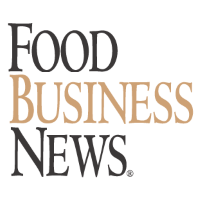
Chickapea raises $3M
By Brooke Just
The Canadian organic and high-protein pasta maker raised C$4.25 million ($3 million) in a funding round led by AGT Foods.
Want to share this newsletter on social media? You can use this link: Newsletter Link
The material in this newsletter is copyrighted and may be reprinted by permission only. All requests must be in writing. Please use our contact form to request republication rights.
Newsletter Archive
Quick Hits
* I was recently interviewed on INFRA’s The Buyer’s Desk podcast, where we discussed organic integrity, among many other things.
* The “best organic city” in Europe.
* The GMO-labeling movement in Canada is picking up steam and asking for signatures.
* As an alternative to alcohol, The Republic of Tea is now offering a 12 oz. glass bottled iced tea sampler case in a variety of flavors, including pomegranate green tea and blackberry sage black tea.
* AEG, the world’s leading sports and live entertainment company, and Tractor Beverage Company have signed a partnership bringing organic options to music fans at live events.
* Article 6 has secured the rights for The Detox Project across 31 countries, bringing Glyphosate Residue Free certification to more markets than ever before.
* Burroughs Family Farms will be hosting its 5th Annual Regenerative Tree Nut Field Day on January 27-28, 2026.
* In celebration of Organic Harvest Month, Rodale Institute is offering its annual Organic Hero gift box.
* Missy Hughes, a former Organic Valley executive, is running for governor in Wisconsin.
* The Regenified label risks the credibility of regenerative agriculture.
* This reprehensible NYT op-ed wants us to believe that spraying the cancer-causing glyphosate on our food supply is perfectly safe.
* North America’s 50 Best Restaurants.
